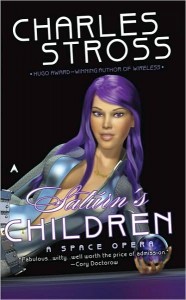 Two centuries after mankind died out, its legacy continues, as all manner of self-aware robots have spread out to conquer the solar system, building outposts and cities from Mercury to Eris, and beyond. Some made in the image of their creators, others built for very specialized jobs, they’ve created a society all their own, as complex as any humans ever formed. From living hotels and spaceships to decadent slave-owning aristocracy, they pursue their dreams and schemes. Enter Freya, one of a dwindling number of femmebots, robots originally designed to bring pleasure and companionship to their human masters, now obsolete and purposeless in an all-robot universe.
Two centuries after mankind died out, its legacy continues, as all manner of self-aware robots have spread out to conquer the solar system, building outposts and cities from Mercury to Eris, and beyond. Some made in the image of their creators, others built for very specialized jobs, they’ve created a society all their own, as complex as any humans ever formed. From living hotels and spaceships to decadent slave-owning aristocracy, they pursue their dreams and schemes. Enter Freya, one of a dwindling number of femmebots, robots originally designed to bring pleasure and companionship to their human masters, now obsolete and purposeless in an all-robot universe.
Freya’s at her wits end, contemplating an end to her existence, when circumstances conspire against her, bringing her into the employ of the Jeeves Corporation as a courier. Her first mission is to transport a simple, much-coveted, highly-illegal object from Mercury to Mars. Disguised as one of the aristocracy, she sets out on the first leg of a journey that will take her much further than she ever imagined. As Freya’s pulled deeper into a conspiracy that spans decades and planets, she’ll learn a dark secret about her own robot lineage, deal with some of the most dangerous androids alive, and be forced to choose her destiny. It’s definitely more than she was originally programmed for, and it’s only getting worse…
Saturn’s Children is what happens when Charles Stross, already one of the most imaginative, cutting-edge science fiction authors out there, mixes up some James Bond and Honey West, and filters the whole thing through Robert Heinlein’s Friday. Stross paints an interesting picture of a future where androids have inherited the solar system, where they’ve created a society all their own, yet they can’t escape their own programming, or the influence of the humans they outlived. These androids act like people, full of desires and fears and needs — needs for company, for freedom, for living space and sustenance — but every time you start to relax and forget that this setting is entirely devoid of humans, Stross finds a way to remind you. He draws from a Japanese influence in part, populating the universe with bishojo aristocracy, their chibiform servants, femmebots, and of course all sorts of specialized robots that defy easy description. It’s familiar, and very alien.
The plot might seem a little convoluted as it meanders from planet to planet, with layers of a grander set of schemes being peeled away over the course of the book, but ultimately, it all works out quite nicely. It’s one part Maltese Falcon (i.e. ‘hunt the MacGuffin’) one part complicated power play, and a heavy dose of putting the heroine through the wringer. There’s a rather distinct subtheme of sexuality running through the book, which comes as no surprise given that the protagonist was built as a concubine and pleasurebot, but at the same time, it’s somewhat disconcerting. I’m not sure if this is because of the heavy Heinlein influence (when I think of Heinlein, I usually think of his juveniles first and foremost, rather than his more adult work), or simply because these are robots with sex drives. I guess even though humanity’s gone, some of our remnants are anatomically correct. (And some are just… okay, you don’t have to be shaped like a human in order to find pleasure, it seems.) Obviously, this is a thought-provoking element of the book. If someone’s uncomfortable with robots having sex, does that make them a robophobe?
It’s actually interesting that Freya, who’s about as close as one can get to appearing human, is a target for bigotry and bias, since most robots (and robot is actually a dirty word for them) manage to simultaneous hate, fear, miss and worship their long-gone creators. She represents the thing they fear, the thing they’d have to serve if humans ever came back, and so her reception suffers as a result. Again, there’s a lot to think about here.
Saturn’s Children may be one of Stross’ more accessible works, when compared to The Atrocity Archives or The Jennifer Morgue, and it’s deceptively straight-forward on the surface. Stross does space opera, à la Heinlein, what’s to complain about? But it’s as thoughtful, complex, and bizarre as any of his works. He’s outdone himself with this one. It’s friendly and inviting, but once it’s pulled you in, it starts to really play with your perceptions. When I started this review, I wasn’t exactly sure what I thought of this book. I enjoyed it immensely, but I was never able to fully relax with it, for whatever reason. Ultimately, I’d have to say that he’s done a superb job at telling an exciting story that makes you think afterwards. It’s a sexy, strange, space opera/spy thriller that delivers a kick, and Stross is definitely at the top of his game here.
Originally reviewed for SF Site, 2008
